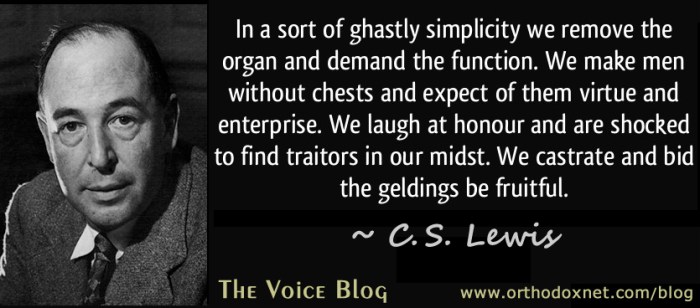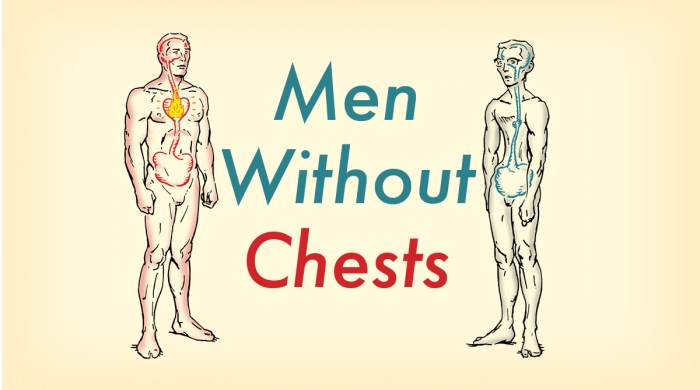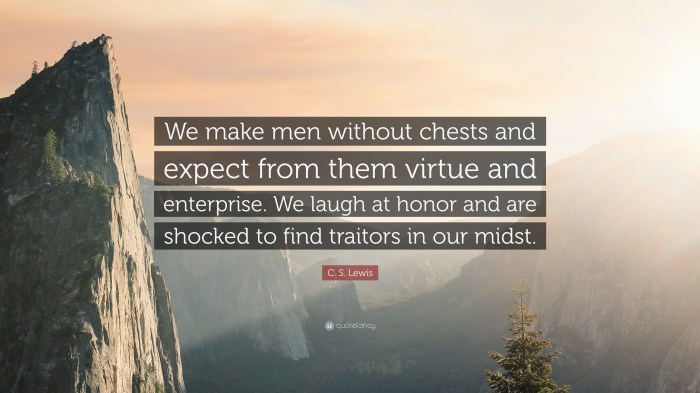C.s. lewis men without chests – In the realm of literature and philosophy, C.S. Lewis’s concept of “Men Without Chests” has ignited a profound exploration of the impact of technological advancements on human emotionality. These individuals, devoid of empathy and compassion, pose a pressing challenge to the fabric of society, and their prevalence raises concerns for the future of masculinity and human connection.
As technology permeates every aspect of our lives, it is imperative to examine its potential consequences on the human psyche. Lewis’s insightful observations provide a lens through which we can understand the rise of emotionally stunted individuals and the urgent need for a more holistic approach to education, mentorship, and community engagement.
Men Without Chests

In his book The Abolition of Man, C.S. Lewis coined the term “Men Without Chests” to describe a type of person who is devoid of the traditional virtues of courage, compassion, and wisdom.
Examples of Men Without Chests
Lewis identified several examples of Men Without Chests in literature and real life. These include:
- The Nazis, who were characterized by their ruthlessness and lack of empathy
- The Puritans, who were known for their strict moral code and intolerance of dissent
- The modernists, who rejected traditional values and embraced a nihilistic worldview
Implications of Men Without Chests
Lewis argued that the rise of Men Without Chests has had a devastating impact on society and culture. He believed that these men are incapable of governing themselves or others and that they will ultimately lead to the destruction of civilization.
The Impact of Technological Advancements

Technological advancements have significantly contributed to the rise of “Men Without Chests.” The advent of social media and the internet has profoundly shaped this phenomenon.
Social Media and the Internet
Social media platforms provide individuals with an unprecedented ability to curate their online presence, often prioritizing aesthetics and superficiality over substance. This has led to a culture that values external validation and appearance, diminishing the importance of intellectual and moral development.The
internet, with its vast repository of information, can be a double-edged sword. While it offers access to diverse perspectives, it can also contribute to echo chambers and the spread of misinformation. This can reinforce existing biases and hinder critical thinking, fostering a shallow and narrow-minded approach to life.
Education and the Development of Emotional Intelligence

Education plays a pivotal role in fostering emotional intelligence and empathy in young men. It provides a structured environment where educators can intentionally cultivate these essential qualities, shaping the future generation of emotionally aware and responsible individuals.
Integrating Emotional Intelligence into Education
Integrating emotional intelligence into traditional education systems presents both challenges and opportunities. One challenge lies in the need to shift the focus from solely academic achievement to a more holistic approach that values emotional and social development. This requires a paradigm shift in education, where emotional literacy is recognized as an equally important skillset as cognitive abilities.
Opportunities arise in the form of innovative educational programs that prioritize the development of emotional intelligence. These programs employ various strategies, such as:
- Self-awareness exercises:Activities that encourage students to identify and understand their own emotions.
- Empathy-building activities:Role-playing, perspective-taking exercises, and discussions that foster understanding of others’ feelings.
- Social and emotional learning (SEL) curricula:Comprehensive programs that integrate emotional intelligence skills into core academic subjects.
The Role of Mentorship and Role Models

Mentorship and role models play a crucial role in shaping the development of young men. They provide guidance, support, and inspiration, helping young men navigate the challenges of adolescence and adulthood.
Positive male role models embody qualities such as emotional intelligence, empathy, and resilience. They demonstrate healthy relationships, responsible decision-making, and a commitment to personal growth.
Mentors
Mentors are individuals who provide ongoing support and guidance to young men. They offer advice, encouragement, and a listening ear, helping young men develop their skills, confidence, and self-awareness.
- Mentors can be teachers, coaches, counselors, or community leaders who have experience and wisdom to share.
- They can provide guidance on academic, career, and personal matters, helping young men navigate the complexities of life.
- Mentors can also help young men develop a sense of purpose and direction, inspiring them to reach their full potential.
The Importance of Community and Connection: C.s. Lewis Men Without Chests
Community and connection play a vital role in promoting emotional well-being and resilience in men. Participating in community groups, sports, and other social activities can provide men with a sense of belonging, purpose, and support.
C.S. Lewis’s “Men Without Chests” critique of modern education resonates with the idea of neglecting the cultivation of emotions and intuition. In this context, exploring words that start with hosp , such as hospitality and hope, highlights the importance of fostering human connection and emotional intelligence.
Ultimately, C.S. Lewis’s concept of “Men Without Chests” underscores the need for a balanced education that embraces both the rational and the emotional aspects of human nature.
Benefits of Community and Connection, C.s. lewis men without chests
- Reduced isolation and loneliness:Community involvement helps men feel connected to others and reduces the risk of social isolation and loneliness, which can have detrimental effects on mental health.
- Increased sense of belonging:Participating in community groups or activities can provide men with a sense of belonging and acceptance, which can boost self-esteem and confidence.
- Improved coping mechanisms:Community connections can provide men with a support system and resources to help them cope with stress, adversity, and mental health challenges.
- Increased physical activity:Many community activities involve physical activity, which can improve overall health and well-being.
- Enhanced cognitive function:Social interaction and engagement in community activities can stimulate cognitive function and reduce the risk of cognitive decline in later life.
Impact of Isolation and Loneliness
Isolation and loneliness can have significant negative effects on men’s mental health. Men who are isolated or lonely are more likely to experience:
- Depression and anxiety
- Substance abuse
- Suicidal thoughts and behaviors
- Poor physical health
- Increased risk of chronic diseases
The Future of Masculinity
In a future society, where “Men Without Chests” are no longer the norm, masculinity will be redefined in a more inclusive and emotionally intelligent way. Men will be encouraged to express their emotions, connect with their feelings, and develop their emotional intelligence.
They will be seen as strong, capable, and compassionate individuals who are not afraid to show their vulnerability.
Characteristics and Qualities of Men in a Future Society
Men in this future society will possess a range of positive characteristics and qualities, including:
- Emotional intelligence: They will be able to identify, understand, and manage their own emotions, as well as the emotions of others.
- Empathy: They will be able to put themselves in the shoes of others and understand their perspectives.
- Compassion: They will be concerned with the well-being of others and will be willing to help those in need.
- Resilience: They will be able to bounce back from setbacks and challenges.
- Integrity: They will be honest, trustworthy, and ethical.
Potential Benefits and Challenges of Redefining Masculinity
Redefining masculinity in a more inclusive and emotionally intelligent way has the potential to bring about a number of benefits, including:
- Improved relationships: Men will be able to form deeper and more meaningful relationships with others.
- Reduced violence: Men will be less likely to engage in violence, as they will have healthier ways to express their emotions.
- Increased happiness: Men will be happier and more fulfilled, as they will be able to live more authentic lives.
However, there are also some potential challenges to redefining masculinity, including:
- Resistance to change: Some men may be resistant to changing the traditional definition of masculinity.
- Backlash from society: There may be backlash from society, as some people may view redefining masculinity as a threat to traditional values.
- Lack of role models: There may be a lack of role models for men who want to redefine masculinity.
Despite these challenges, the potential benefits of redefining masculinity are significant. By encouraging men to express their emotions, connect with their feelings, and develop their emotional intelligence, we can create a more inclusive and compassionate society for all.
FAQ
What is the central idea behind C.S. Lewis’s “Men Without Chests”?
Lewis argued that technological advancements can lead to the rise of individuals who prioritize intellect and logic over emotions, resulting in a lack of empathy and compassion.
How does technology contribute to the rise of “Men Without Chests”?
Social media, the internet, and other digital platforms can create echo chambers that reinforce narrow perspectives and limit exposure to diverse viewpoints, potentially fostering emotional detachment.
What role does education play in addressing this issue?
Education can promote emotional intelligence by integrating programs that teach empathy, mindfulness, and interpersonal skills, helping young men develop a well-rounded understanding of themselves and others.
How can mentorship and role models influence the development of emotional intelligence in young men?
Positive male role models who embody emotional intelligence and empathy can provide guidance and support to young men, helping them navigate the challenges of adolescence and develop healthy emotional habits.